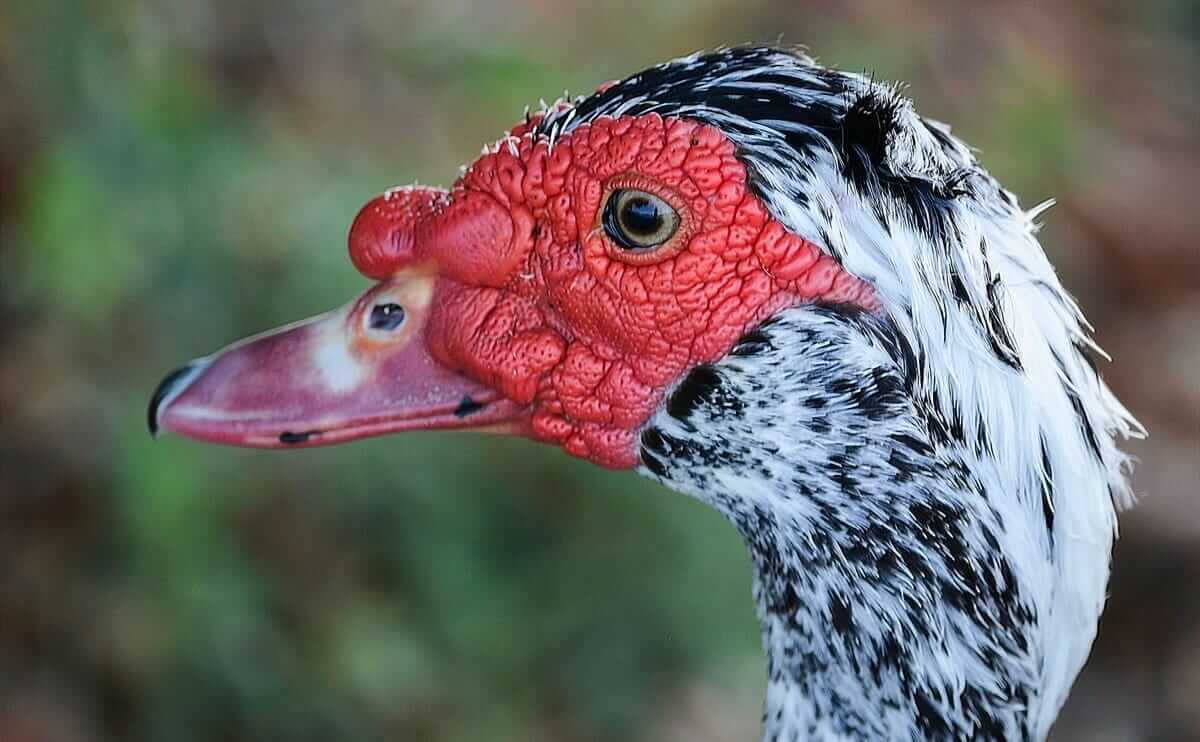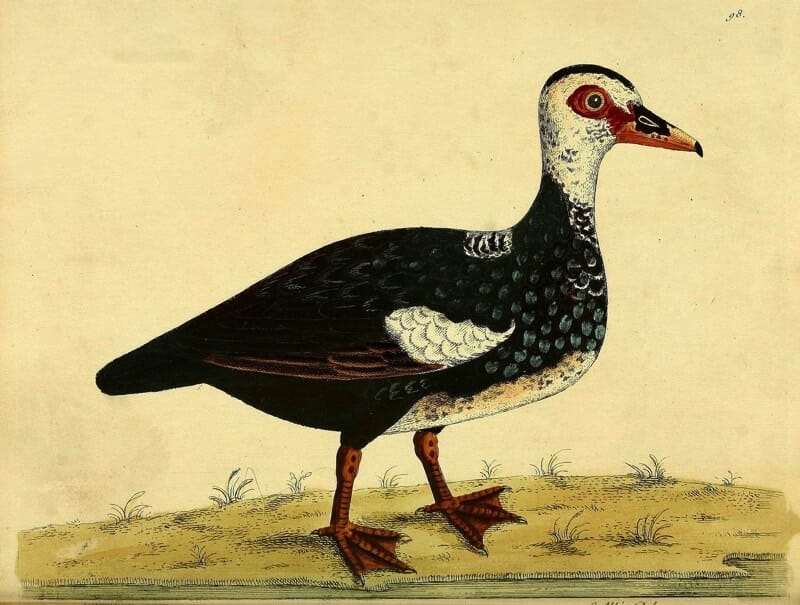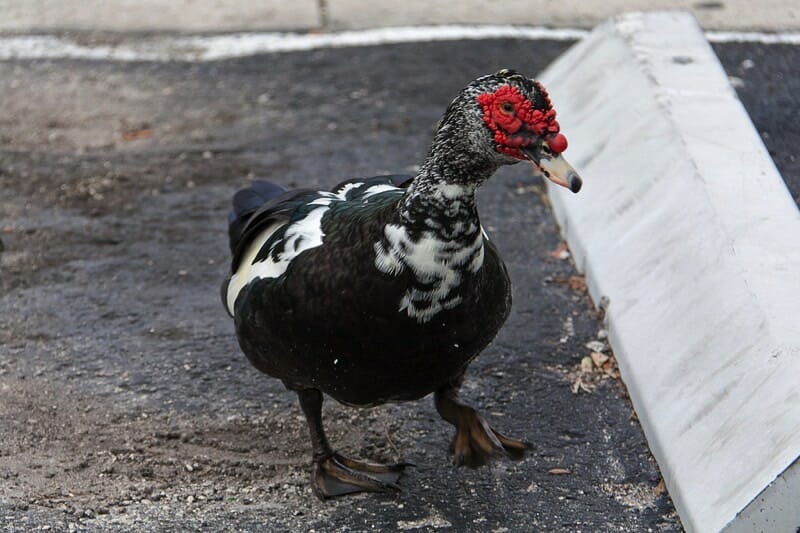A bird so strange that, more than 150 years after Jewish authorities first began discussing it, nobody can decide whether it's kosher today.

The duck family is large and varied: There are tropical ducks and arctic ducks, ridiculously colorful ducks and boringly drab ducks, ducks that hunt for fish or other prey, and ducks that are obligate vegetarians. Almost all breeds of domestic duck are descended from the very familiar mallard, but the Muscovy duck is an entirely different species. The Muscovy duck has no close relatives, and scientists aren’t really sure how to categorize the thing. It’s been variously placed in the “perching duck” group along with the wood duck; the “dabbling duck” group along with the mallard; and these days, some mitochondrial DNA sequencing suggests it might be in the shelduck family, along with a bunch of other ducks from halfway across the world.
So you can understand why the Muscovy duck was so confusing to the new residents of the New World, who were only familiar with the common mallard-derived domesticated ducks. When Europeans arrived in the Americas, they found that the Muscovy had been semi-domesticated and used for meat and eggs by various peoples, but those Europeans were barely convinced it was even a duck. There is nothing like it in Europe, Africa or Asia, which makes the Muscovy like a lot of other flora and fauna in the Americas, except the Europeans immediately wanted to eat the thing.
As the breed is native to the warmer parts of the New World, it achieved some popularity among the residents of such cities as New Orleans by the mid-1800s. At that point, New Orleans had a smallish but observant Jewish community, which was eating Muscovy duck just like the rest of the locals. That is, until one Rabbi Dr. Bernard (Yissochar Dov) Illowy moved from what’s now the Czech Republic to New Orleans to lead the Jewish community there. Illowy, through sheer force of personality, created a firestorm of debate about the Muscovy duck that exists to this day.
The rules of Kashrut are scattered across the Old Testament, declaring foods kosher (fit to eat) with little to no explanation. Many of the rules are simply guidelines for Biblical-era food safety, a sort of Health Department of the time: pork goes rancid quickly, so don’t eat it. Shellfish are bottom-feeders and can have parasites, so don’t eat them. But the rules for eating birds are surprisingly vague, given the prominence of fowl in Jewish cuisine.
Instead of providing guidelines about which edible birds are kosher and which aren’t, Leviticus 11:13-19 simply lists 24 birds that aren’t kosher, leaving observant Jews to assume that any birds not on the list are OK to eat. That list:
[mf_blockquote layout=”left”]13 “‘These are the birds you are to regard as unclean and not eat because they are unclean: the eagle, the vulture, the black vulture, 14 the red kite, any kind of black kite, 15 any kind of raven, 16 the horned owl, the screech owl, the gull, any kind of hawk, 17 the little owl, the cormorant, the great owl, 18 the white owl, the desert owl, the osprey, 19 the stork, any kind of heron, the hoopoe and the bat.”[/mf_blockquote]
Biblical scholars got together and analyzed those verses, reading between the lines to come up with some guidelines. Those guidelines were sorely needed because the scribes that composed the Old Testament were not aware of the existence of, say, the prairie chicken, or the American turkey. In general, the scholars’ rules prohibit the eating of birds that are predators (dores, in Hebrew), citing all the birds of prey in the list that appears in the Bible. (This turns out to not be that helpful; hawks are easy to peg as predators, sure, but many birds are omnivorous, or mostly vegetarian but occasionally found to feast on bugs or small amphibians or who knows what else.) But the guidelines, not being as binding as laws that actually appear in the Bible, are a little fluid, and if a biblical scholar makes a strong enough argument, he can ban or allow the eating of certain birds within his community. Those rules include stuff like “does the gizzard have an inner lining that can be peeled?” and “do Jews have a history of eating this creature?” Even with more specific interpretations like these, it can still be very difficult to figure out whether it’s OK to eat a bird if the bird is so unlike any you’ve ever seen.
Domestic ducks are kosher, though duck is not a particularly common protein on the Jewish table (except perhaps in Sephardic, or Mediterranean, families). But the Muscovy was so weird that Rabbi Illowy, upon moving to New Orleans and finding it eaten there, immediately declared it off-limits. New Orleans Jews were familiar with the Muscovy, and told the new rabbi that there was indeed a history of eating this bird, therefore making it kosher, but Illowy arbitrarily declared, according to Kashrut.com, that he doubted the expertise of the rabbis who had allowed the eating of the Muscovy in the past.
Various other rabbis in other parts of the world – Argentina, Jerusalem, Hungary – took up the debate, arguing whether it was permissible to eat this weird American duck. No real conclusions were reached; Jewish law is a serious matter, but so is arguing, and rabbis never pass up a chance at a truly epic argument. Eventually most rabbis declared that if you had already eaten the Muscovy, you had a history of eating the Muscovy, and were therefore allowed to continue eating the Muscovy. But if you had never eaten it, you had no history, and were thus banned from eating the breed.
The Muscovy duck never became nearly as popular as the mallard in the U.S., but bizarrely enough, it is very popular in, of all places, Israel. A scholarly paper from late 2010 from Zohar Amar and Ari Z. Zivotofsky documents its wide acceptance there. The duck was fairly common in Israel by the late 19th century and was never really considered anything but a kosher duck there. In fact, in early 2010, an Israeli duck farmer shipped, by accident, a huge shipment of Muscovy ducks instead of mallards to kosher communities in the U.S., where the shipment of strange alien-looking ducks was greeted with horror.
The final ruling on whether the Muscovy is kosher comes down to which community’s rules you follow. It’s not nearly as simple as reading the Bible and making a note; this is an argument that can, and probably will, go on forever.
Images (in order from top to bottom) via Flickr users C.P. Ewing, the Biodiversity Heritage Library, and John Spade


Just wanted to correct the notion espoused in the article that Rabbis read between lines of Torah text and came up with guidelines. Along with the written Torah text, there was also an orally transmitted Torah which gives the details. Eventually, the oral law was written down in such a way that it wouldn’t be lost, but still required transmission from Rabbi or parent, to student or child. This is the Mishna, and later also Gemara which is further elucidation. The rabbis didn’t invent guidelines, as the Torah forbids creating or subtracting mitzvot-commandments. The issue is making determinations based on… Read more »
This is a very fun article. This kosher-keeper thanks you. Just please, Modern Farmer writers and editors, in the future please refer to the Bible we Jews use as The Hebrew Scriptures, The Hebrew Bible, or Tanakh (acronym of the Hebrew words for “Pentateuch, Prophets, Writings”.) OT is a bit derogatory to us.
What about the Muslim diet